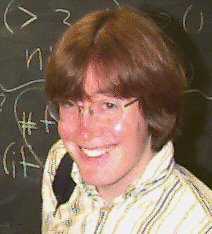Last Modified (quickly) 6 November, 1999
Joanna J. Bryson

 Hi there.
Hi there.
My name is Joanna Bryson. I work at the Artificial Intelligence Lab at
MIT.
I am a candidate for a PhD (expected within the millennium),
under Lynn Stein.
I'm associated with
The Leg Lab,
but I'm currently in
Edinburgh.
Quote of the random time interval: "We managed to get home. There were
many problems along the way. They even used water hoses to prevent us
from going home. They demanded that we lay down our arms. We refused
to obey. It was not enough that we were killed by bombs, now they are
beating our parents. I shall not go back there. This is not a war,
this is frenzy in which it is both difficult to survive and to remain
sane. I want to keep my senses. I don't want to kill anyone, nor do I
want to be killed..." ---
A Serbian conscript who returned home after a war protest in his
home village, May 1999
Old quotes are here.
This page is due for a major revision within the next few weeks. In
the mean time, my home page in
Europe is still a bit more up to date, even though I'm back at the
AI Lab.
My Research
I'm interested in how intelligence works, in people and in animals.
(I don't think you can understand the former without the latter!) My
research starts from a distributed model of intelligence called reactive, behavior-based reasoning. This
approach has produced the first robots that can reliably interact with
the real world at realistic, animal-like speeds. However, by the time
I started working on this problem in 1993, it was already obvious that
the approach wasn't scaling very well. In other words, no new purely
behavior-based robots have come out that could behave in a
significantly more complex way than the early projects such as Herbert and Polly
.
Since 1993, I have been working on exploring and extending the
capabilities of the behavior-based approach. This work has taken me in
three major directions:
Other Sides of My Research
Here's a research-oriented list of Related Web Sites .
The best supported theory in science is the theory of evolution.
We don't understand evolution perfectly, but we understand it better
than we understand gravity. If you don't know basic evolution theory,
you will have trouble understanding not only biology, but also modern
theories of society (including religion) and intelligence (including
artificial intelligence). If you aren't getting a good background on
evolution at school, try reading some of the links off John Wilkins's
Evolution Links page.
Other Bits of Life
Finding me: I'm currently doing research with Brendan McGonigle in
the Intelligent
Systems Laboratory at the
University of Edinburgh. If you need to contact me, see the
address at the bottom of the page. I turn up periodically at MIT,
but I'm living in Scotland until at least September 1999.
I've previously TAed undergraduate AI
(6.034) in case your curious what that's like at MIT.
I have RSI, clicking there will
get you to a good information server about typing injuries. I have a
datahand keyboard, clicking
there will show you a picture of one.
Jane Greening and Bruce Lynn of UCL have research indicating
RSI really is nerve damage. Check it out!
If you work in MIT-NE43, you might want to join RSI mailing list that I
set up. If you are in AI, just edit the alias file, otherwise you can
email me.
The Artificial Intelligence Lab / Lab of Computer Science Soccer teams
The Cold Booters kick grass. I wrote the Cold Booters C
League Home Page, and I'll sign up anyone who emails me to
whichever league they like. We practice occassionally all year, but
the IM season propper is Fall term.
Even though hockey is evil (it takes people away from soccer!) I am
also playing with
Halting Problem, which I only admit because it's such a great
name.
Politics... Check out the City of Cambridge home page
which has links to the US federal government and MA state
government as well.
The local phone numbers for MIT area Congresspeople are Ted Kennedy
565-3170, John Kerry 565-8519 and (Rep for Cambridge and Somerville)
Joe Kennedy 252-0200. A couple of good causes:
Computer Scientists for Social
Responsibility have put together a year 2000 rumor
central web page that's worth reading.
The Centre for Alternative Technology
can help you save the world.
My Past
In case you are trying to figure out if you know me, or if you just
want to know about some really cool people and places, here's my
life's history:
I am late of LEGO Futura (Boston Branch), Marble Associates,
the Department of AI at U of
Edinburgh, LaSalle Street in Chicago,
The College of the University
of Chicago, and Glenbard North
Highschool in Carol Stream,
Illinois. I spent the late 60's
in Omaha, Nebraska (but I don't remember them,) and I was born in
Milwaukee, Wisconsin, like Herbert Simon.
Here's my resume', in case you are looking for
excuses to give me money.
Acknowledgments
Thanks to Andrew Fitzgibbon for telling me "millennia" is plural.
The guys at the Computer
Vision Group at Trinity College Dublin first harassed me about not
having a Web page, so now I do, and in return I'd like to suggest the
world drop by and ask Gerry Lacey where's the best place to go for a
pint.
I must acknowledge Will
Lowe, though I can't say for what in public. (Parse that
in British!)
Joanna Bryson
(This pointed to my
finger back in pre-spam, pre-hacking-paranoia days)
joanna@ai.mit.edu
MIT Artificial Intelligence Laboratory
545 Technology Square, Room 006
Cambridge, MA 02139
(617) 253-2475 (Jerry & Mike's extension)
 Hi there.
Hi there.  Hi there.
Hi there.